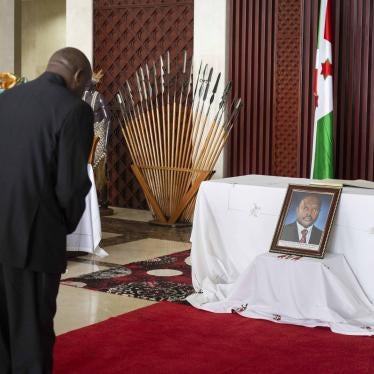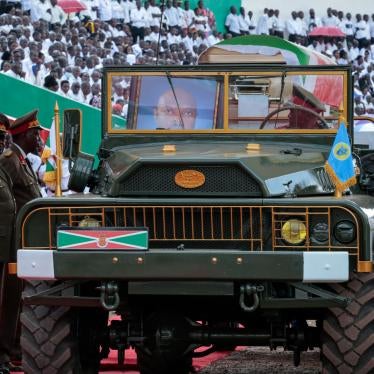July 13, 2020
His Excellency President Évariste Ndayishimiye
Re: Protecting Human Rights in Burundi
Your Excellency,
Please accept my regards on behalf of Human Rights Watch and our condolences for the death of your predecessor, Pierre Nkurunziza.
Human Rights Watch is an independent, nongovernmental organization that monitors human rights developments in more than 100 countries around the world. We have reported on human rights concerns in Burundi since 1995.
We are writing to raise important concerns and share our recommendations on steps your government should take to advance and protect human rights in Burundi. We hope that you will address these issues and make the protection and promotion of human rights a top priority throughout your presidency. We urge you to work to make systemic changes to end the violence and abuse, fueled by widespread impunity, that have plagued the country for far too long, especially since 2015.
While we regret the former administration’s withdrawal of Burundi from the International Criminal Court, which took effect in 2017, we are encouraged by the commitments stated in your inaugural speech to reform the judiciary and ensure that all government or other officials who commit offenses are held accountable. Your assurances that measures will be taken to protect victims and witnesses are critical to delivering this promise, as is your commitment to ensuring that corruption will not be tolerated.
We urge you to take strong, bold, and concrete steps – from early in your presidency – to mark a clear break with the abusive practices that characterized the former administration. We note the appointment of Prime Minister Alain Guillaume Bunyoni and Minister for the Interior, Community Development and Public Security Gervais Ndirakobuca, both under international sanctions for their alleged role in violence in 2015, and urge you to ensure that criminal investigations into past abuses take place without interference.
The challenges ahead are enormous. Today, there are over 300,000 Burundian refugees outside the country, many of whom fled in the aftermath of former President Pierre Nkurunziza’s decision to run for a third term. We urge you to stay true to your assurances that political exiles and refugees can safely return to the country. The pervasive climate of fear can only be tackled through bold support for transparency, accountability, and human rights. Refugees should not be pressured into returning, and those who choose to voluntarily return should be protected from retaliation.
The current election cycle has seen political tensions rise, particularly between members of your party and the opposition National Congress for Freedom (Congrès National pour la Liberté, CNL). We documented widespread abuses perpetrated by state actors and members of the Imbonerakure youth league in the lead up to the vote. Violent incidents occurred during the election campaigns, leading to injuries and casualties on both sides. Your commitment to strengthening dialogue is positive, but for democratic space to thrive and the rights of Burundians to be upheld, they should not be required to speak “the same language as the government,” as you suggested in your speech. Burundians should be free to peacefully express dissent, concerns, opinions or questions about the government’s actions through any means they choose.
In addition, although we welcome your commitment to uphold freedom of expression, your warnings against civil society organizations that “limited themselves to criticism” are a source of concern. Media and human rights organizations should be able to denounce rights violations without fear of retaliation and exposing human rights violations should not be seen as “unveiling secrets to foreigners.” Whistleblowers play a vital role in holding leaders accountable and should not be labelled “acculturated” or “hostile to the rights and interests of Burundian citizens.”
Your commitment to focus on development is an important step towards realizing the economic and social rights of Burundians. Equally, we welcome your emphasizing the importance of access to healthcare and your announcement on June 30 that the government will take measures to address the Covid-19 pandemic and ramp up testing. We hope that this will mean the government will adopt a more transparent and rights-respecting response to Covid-19. Government authorities should refrain from using threatening language towards people who refuse to be tested and ensure that accurate and up-to-date information about the virus is readily available and accessible to all.
We are concerned that your reference to Burundians who “rose up to build with their own hands public, education, health care, sport, [and] tourism infrastructure” could encourage forced labor practices. In 2019, Human Rights Watch documented how members of the Imbonerakure forced people to contribute money to and participate in the construction of local CNDD-FDD and other administrative offices. International law prohibits compulsory work or service which forms part of mobilizing or for purposes of economic development and bans authorities who do not exercise administrative functions from having recourse to forced or compulsory labor. The Imbonerakure should not be authorized to exercise state security or other similar functions.
Police and national intelligence agents have all too often committed abuses against the people they are meant to protect. Imbonerakure members have killed, disappeared, arbitrarily arrested, raped, beaten and intimidated with impunity. The lack of independence of the judicial system means that many of these individuals feel they are untouchable.
Finally, in light of your comments regarding other countries’ approach to abortion and same-sex relationships, we would like to emphasize that states’ obligations to respect, protect, and fulfill human rights include rights related to reproductive health, bodily autonomy, sexual orientation, and gender identity. Criminalization of or unreasonable restrictions on access to abortion violate the right to health and jeopardize numerous other human rights, including the rights to bodily integrity, nondiscrimination, equality, privacy, information, and the right to decide on the number and spacing of children. As the African Commission on Human and Peoples’ Rights has emphasized, no one should be subjected to violence or discrimination because of their sexual orientation or gender identity.
To address these challenges and demonstrate a real commitment to promoting rights and turning the page on decades of violence, abuse, mismanagement, and impunity, we urge you to take the following steps during your first year in office:
- Remove from security services posts and other executive branches, officials who have been credibly implicated in serious human rights violations, according to reports by the United Nations Commission of Inquiry on Burundi, the UN Human Rights Council, the African Commission on Human and Peoples’ Rights’ fact-finding mission report, and Burundian and international human rights organizations. Ensure that no one who may be subject to criminal or other investigation into human rights abuses is in a position to influence that investigation.
- Instruct the security forces, the local administrators, and the Imbonerakure to stop extortion, the use of forced labor, beatings, arbitrary arrests, threats, harassment, and collection of contributions for state-led projects. Order the Imbonerakure and other officials to dismantle all unauthorized roadblocks.
- Direct the Justice Ministry to thoroughly and impartially investigate past grave violations of human rights with a view to appropriately prosecuting current and former state security officers and government officials who were responsible for serious criminal offenses. These include National Defense Force and police extrajudicial executions of 47 civilians, members of armed groups and other suspected opponents between December 30, 2014, and January 3, 2015 in Cibitoke province; police use of excessive force in a crackdown on protests in 2015; violence against suspected opponents after the protests; allegations of extrajudicial executions by members of the security forces on December 11, 2015 ; torture and ill treatment of suspected opponents by national intelligence agents and police in since 2015; and extrajudicial executions, enforced disappearances, and arbitrary arrests of suspected opponents by national intelligence agents, police, and Imbonerakure members since 2015, including during the periods leading up to the constitutional referendum in 2018 and the elections held earlier this year.
- Ensure a thorough and independent investigation into the crimes and abuses committed by the Imbonerakure. These investigations should lead to fair and transparent prosecutions, and your government should ensure that your party’s youth league is disarmed and not used for any official state security or similar duties.
- End all political interference in the judicial system, facilitate victims’ access to justice, and ensure progress on emblematic cases. This should include the immediate and unconditional release of all political prisoners and prisoners jailed for exercising their fundamental rights, including Germain Rukuki, Nestor Nibitanga, Christine Kamikazi, Agnès Ndirubusa, Egide Harerimana, and Térence Mpozenzi
- Fully protect everyone’s rights to freedom of expression, assembly, and association in accordance with international standards. Lift the suspension on the operations of independent media and human rights organizations, and ensure journalists and human rights activists who are in exile can return safely. Members and supporters of political parties, Burundian and international journalists, and Burundian and international human rights defenders should be able to conduct their work freely, criticize government policies, and organize peaceful protests without fear of intimidation, reprisals, harassment, arrests, or the excessive use of force by the security forces.
- Cooperate with and support regional and international human rights mechanisms and treaties, and act to ensure that Burundian law adequately reflects international human rights commitments. This should include full cooperation with the UN Human Rights Council’s special procedures, including giving the UN Commission of Inquiry on Burundi unfettered access to the country; the resumption of cooperation with the Office of the High Commissioner for Human Rights; finalization of a memorandum of understanding with the African Union’s human rights observer mission and ensuring the observers get unfettered access to the country and its detention facilities; and allow international NGOs to operate without interference.
- Ratify the Rome Statute and align national legislation provisions to cooperate promptly and fully with the International Criminal Court as a court of last resort. Cooperate with the ongoing ICC investigations into alleged crimes against humanity committed in Burundi or by nationals of Burundi outside Burundi until 26 October 2017.
We hope that these recommendations will help guide your actions in the coming months. We would be happy to provide further information or to discuss any of these issues in more detail with you or members of your administration.
Please accept, Mr. President, the expression of our highest consideration.
Your sincerely,
Kenneth Roth
Executive Director
Human Rights Watch








